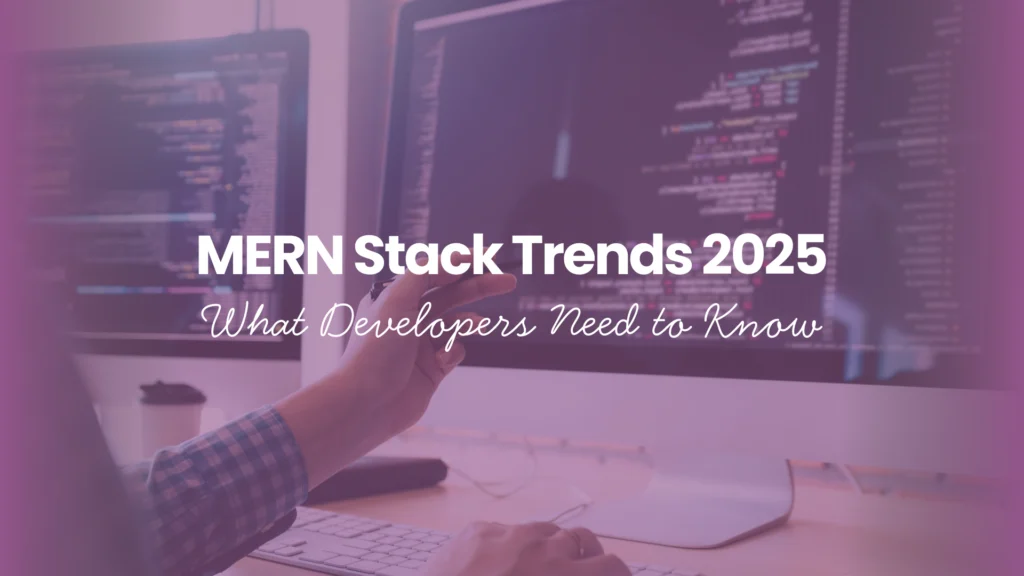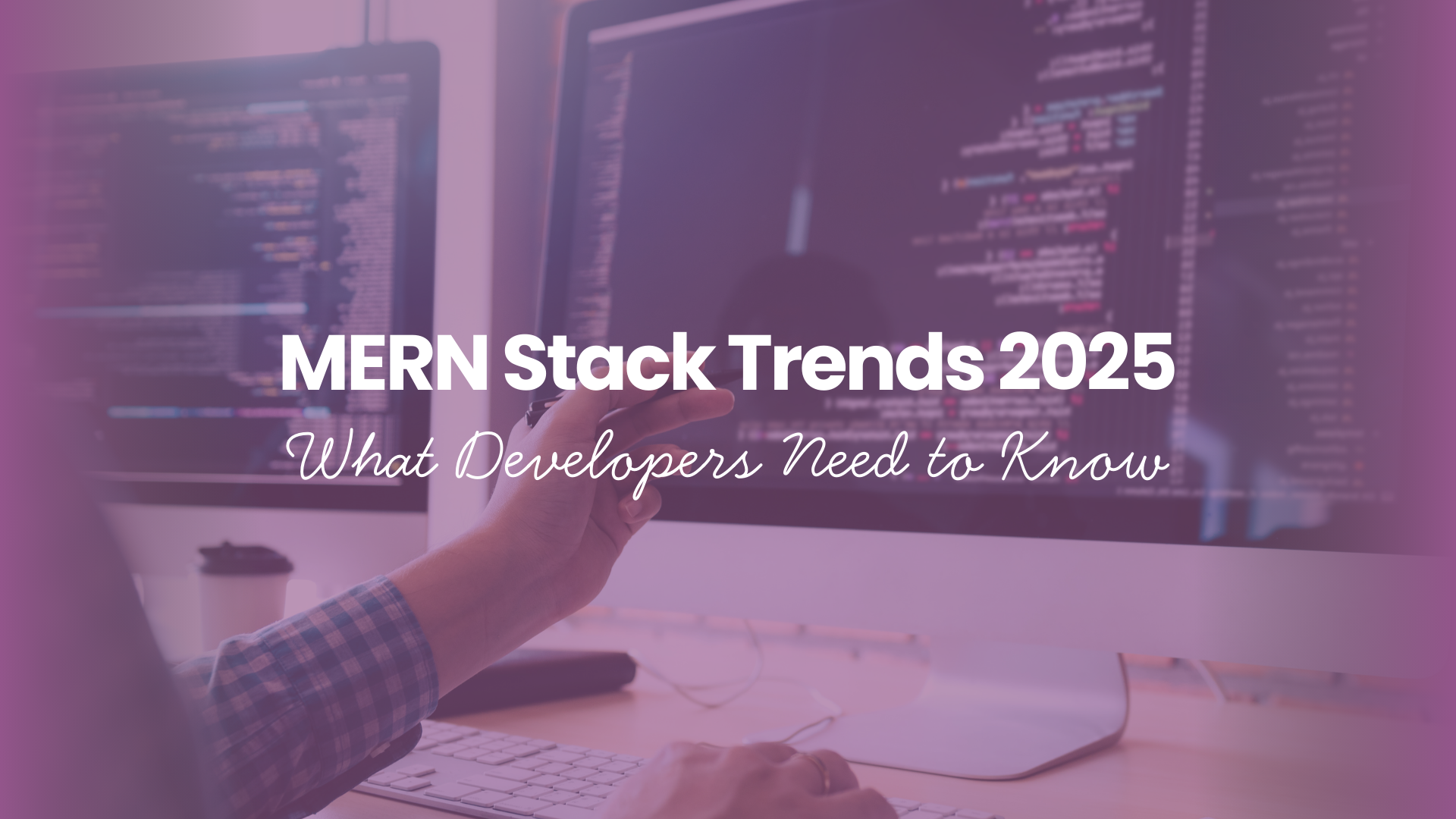
- Byte Legions
- Web Development
Introduction
The tech industry evolves at lightning speed, and staying updated with the latest trends is no longer optional—it’s essential. Among the leading web development technologies, the MERN Stack has maintained its dominance, empowering developers to create scalable, dynamic, and high-performing applications. As we move deeper into 2025, new trends are shaping the way developers use MERN. Let’s dive into what you, as a developer, need to know.
Understanding MERN Stack Basics
What is MERN?
MERN is a technology stack that combines MongoDB, Express.js, React, and Node.js to create modern full-stack applications.
Why MERN dominates full-stack development
The reason developers love MERN is simple—it’s JavaScript everywhere. From the client to the server to the database queries, you work with one language, making development faster and more efficient.
The Rise of MERN in 2025
The demand for MERN developers has skyrocketed, with startups and enterprises alike adopting it for its scalability, speed, and flexibility. Healthcare, e-commerce, fintech, and SaaS companies are increasingly turning to MERN for their digital solutions.
With AI-driven applications, IoT systems, and real-time platforms becoming the norm, MERN stands tall as a reliable choice.
Key Trends in MERN Stack for 2025
AI and Machine Learning Integration
MERN applications are becoming smarter, integrating AI-driven insights and machine learning models directly into apps. For example, chatbots and recommendation engines are now seamlessly embedded into MERN projects.
Serverless Architectures with MERN
Developers are embracing serverless cloud computing. MERN projects now frequently run on platforms like AWS Lambda, enabling cost reduction and faster deployments.
Microservices Adoption
Microservices allow applications to be split into independent components. MERN pairs beautifully with microservices, helping businesses scale efficiently.
Real-Time Applications
With WebSockets and libraries like Socket.IO, MERN enables real-time apps like chat platforms, live dashboards, and gaming applications.
Progressive Web Apps (PWAs) with MERN
PWAs are bridging the gap between web and mobile. MERN developers are creating apps that function offline, load instantly, and feel like native mobile apps.
Low-Code & No-Code Tools in MERN Ecosystem
By 2025, low-code/no-code integrations are allowing even non-technical entrepreneurs to leverage MERN for business apps.
Performance Enhancements in 2025
- React 18+ concurrent features make rendering faster and smoother.
- Node.js continues to evolve with improved scalability and async handling.
- MongoDB Atlas offers advanced scaling, making handling big data simpler than ever.
Security Trends in MERN Development
In 2025, cybersecurity is at the forefront. Developers are implementing JWT authentication, OAuth protocols, and end-to-end encryption to safeguard apps. Following OWASP guidelines has become a must for all serious MERN developers.
The Role of DevOps in MERN Projects
Modern MERN development is incomplete without CI/CD pipelines. Automated testing, containerization with Docker, and monitoring tools ensure that apps run smoothly post-deployment.
MERN Stack and Mobile Development
With React Native, MERN developers now build cross-platform apps that share backend APIs. Businesses rely on MERN to deliver mobile + web ecosystems faster.
For example, an App Development Consultant in USA would likely recommend MERN for startups needing both a website and mobile app with a single codebase strategy.
Case Studies of Successful MERN Projects in 2025
- Healthcare Startups: Real-time telehealth apps powered by MERN.
- E-commerce Giants: Scalable platforms built on MERN with integrated AI recommendations.
- Education Platforms: Learning apps offering offline capabilities using MERN + PWAs.
Future Skills Developers Must Learn
- GraphQL with MERN for optimized data fetching.
- TypeScript to improve code maintainability.
- AI-powered coding assistants integrated into IDEs.
How Businesses Are Benefiting
MERN is not just developer-friendly; it’s business-friendly too. Faster development cycles, scalability, and reduced costs make it a win-win for companies looking to stay competitive.
Challenges Developers Face in 2025
- Constant updates to frameworks.
- Increasing competition among developers.
- Balancing innovation with data security.
Expert Advice for Developers
If you’re a developer in 2025, specializing in MERN can open doors to high-paying jobs and exciting projects. Learn continuously, stay adaptable, and experiment with new integrations like AI and blockchain.
Conclusion
The MERN Stack in 2025 is not just about building apps—it’s about creating intelligent, secure, and scalable digital solutions. As technology advances, MERN continues to evolve, empowering developers to stay ahead of the curve. Whether you’re a business owner or a coder, understanding these trends ensures you remain competitive in this fast-moving tech landscape.
✨ “Ready to get started? Book your spot today and let’s create something amazing together!”
Frequently Asked Questions
1. Is MERN still relevant in 2025?
Absolutely! MERN remains one of the most in-demand stacks for both startups and enterprises.
2. How does MERN compare with MEAN?
MERN uses React instead of Angular, making it more popular among modern developers who prefer flexibility and speed.
3. Can MERN handle enterprise-level applications?
Yes, with microservices and cloud integration, MERN can scale to enterprise-grade applications.
4. Is MERN good for beginners?
Definitely. Since it’s JavaScript-based, beginners find it easier to learn and build projects quickly.
5. What career opportunities exist with MERN?
From full-stack developer to solution architect, MERN skills open diverse job roles across industries.






Comments are closed